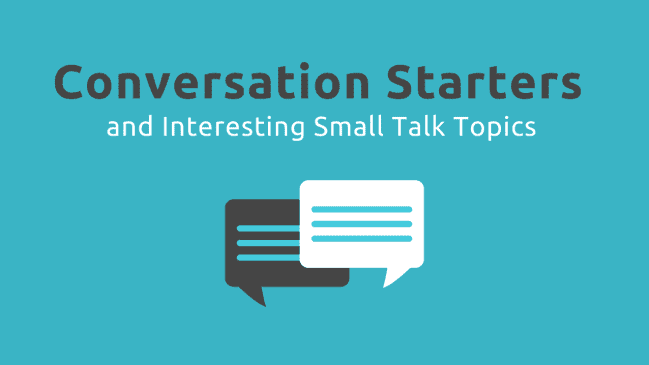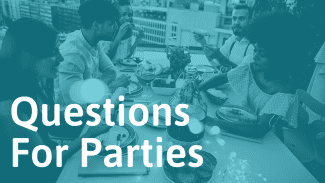Small talk plays a big role in our social lives, even if it isn’t everyone’s cup of tea. These light conversations act as gateways to deeper connections, helping us build rapport with others. Instead of just discussing the weather, small talk topics can be great conversation starters.
Jumping into a deep conversation without small talk might come across as impolite, much like proposing marriage on a first date. So, let’s explore the best small talk topics for different situations and learn how to use them effectively.
Sections
- Small talk topics for work
- Professional events & networking
- Small talk topics for college students
- Starting conversations with a crush
- Small talk topics for parties and social gatherings
- Small talk topics for family reunions
- Hobbies, interests, and other free-time activities
- Lifestyle small talk topics
- Unexpected questions as conversation starters
- Small talk topics to avoid
- Tips for great small talk
- Examples of small talk turned into meaningful conversations
Small talk topics for work
Engaging in small talk at the office can help you build connections with your coworkers and create a positive work environment. Not sure where to start? Try asking these simple questions to spark conversation and get to know your colleagues better.
About the job
- How did you first hear about our company?
- What do you like most about working here?
- What’s your favorite team-building activity we’ve done?
- How long have you been in your current role?
- What’s your favorite project you’ve worked on so far?
- How did you get into your field?
- How do you stay up-to-date with industry trends and news?
Work-Life Balance
- How do you maintain a good work-life balance?
- What’s your favorite way to relax after work?
- Do you have any tips for staying organized at work?
- How do you manage stress during busy times?
Breaks and Lunchtime Conversations
- What’s your favorite place to grab lunch near the office?
- Do you have any recommendations for good coffee shops nearby?
- What’s your go-to lunch meal?
Small talk topics for professional events & networking
Navigating professional events can be much easier when you have the right small talk topics at your disposal. Use these conversation starters to make connections and leave a lasting first impression on your fellow professionals.
Career
- How did you get started in this industry?
- What are your career goals for the future?
Industry trends
- What trends have you noticed in our industry recently?
- Which technologies have you been trying ultimately?
- Do you think AI is going to take our jobs?
- Are there any emerging markets you’re keeping an eye on?
Event-specific topics
- What brought you to this event?
- Have you attended similar events in the past?
- Which speakers are you most excited to hear?
- Are there any workshops or sessions you’re particularly interested in?
Small talk topics for college students
Making friends and connections in college can be a breeze with the right small talk topics. Try these conversation starters to help you break the ice and get to know your fellow students better.
Classes and majors
- What’s your major?
- What’s been your favorite class so far?
- Are there any professors you’d recommend?
- What do you find most challenging about your coursework?
- How do you stay organized and manage your workload?
Campus life
- What clubs or organizations are you involved in?
- Have you attended any interesting campus events recently?
- What’s your favorite spot on campus to hang out or study?
- Do you live on campus or commute?
- What do you like most about your college or university?
Extracurricular activities
- What hobbies or activities do you enjoy outside of class?
- Are you part of any sports teams or intramural leagues?
- Do you volunteer or participate in community service projects?
- Have you attended any concerts or performances on campus?
- What do you do for fun during your free time?
Study tips and strategies
- How do you prepare for exams or big projects?
- What study tips have worked best for you?
- Do you prefer to study alone or with a group?
- Do you have any tips to stay focused and avoid procrastination?
Future plans
- What are your plans after graduation?
- Are you considering graduate school or entering the workforce?
- What kind of job or career are you hoping to pursue?
- Have you had any internships or work experiences related to your field?
You might also like this article on how to introduce yourself at college.
Small talk topics to start conversations with a crush
Starting a conversation with your crush can be nerve-wracking. The right small talk topics can help you break the ice and get to know each other better. Here are some light and engaging conversation starters to spark interest and build a connection.
Hobbies and interests
- What do you like to do for fun in your free time?
- Are you into any sports or fitness activities?
- What kind of music (movies, TV shows) do you enjoy?
- Do you have any favorite books or authors?
- Are you a fan of any podcasts or YouTube channels?
Travel and adventure
- Have you traveled to any interesting places recently?
- What’s your dream vacation destination?
- Do you prefer the beach, mountains, or city getaways?
- What’s the most memorable trip you’ve ever taken?
- Are you a spontaneous traveler or a planner?
Food and drink
- What’s your favorite type of cuisine or dish?
- Are there any local restaurants or cafes you’d recommend?
- Do you enjoy cooking or baking at home?
- What’s your go-to comfort food?
- Are you a coffee or tea person?
Personal growth
- What’s something new you’ve tried or learned recently?
- Do you have any goals or aspirations you’re working towards?
- What’s a challenge you’ve overcome that you’re proud of?
- Are there any habits or routines that help you stay motivated?
- What’s a skill you’d like to learn or improve?
Fun and lighthearted questions
- If you could have a superpower, what would it be?
- What’s your favorite way to relax and unwind after a long day?
- If you could meet anyone, living or dead, who would it be?
- What’s a hidden talent or something most people don’t know about you?
- If you could time travel, would you go to the past or the future?
You can go deeper with these articles on how to start a conversation with a girl or with a guy you like.
Small talk topics for parties and social gatherings
Social gatherings are the perfect opportunity to meet new people and enjoy lively conversations. These small talk topics will help you navigate party chatter and make connections at any event.
Icebreakers
- How did you hear about this event or party?
- Do you know the host well?
- Have you been to a gathering like this before?
- What brings you here tonight?
Entertainment and pop culture
- Have you seen any good movies or shows recently?
- What’s your favorite type of music or band?
- Are there any upcoming concerts or events you’re excited about?
- Do you follow any popular TV series or binge-worthy shows?
- What was the last book you read or movie you watched that you’d recommend?
Food and drink at the party
- Have you tried the appetizers? Which one is your favorite?
- Can you recommend a drink from the bar?
- Do you have any favorite party snacks or dishes?
- What’s your go-to party drink or cocktail?
- Have you ever tried making any of the dishes served here?
Local happenings and events
- Have you attended any interesting local events lately?
- Are there any upcoming festivals or community gatherings you’re looking forward to?
- What’s your favorite way to enjoy the local area?
- Do you know of any hidden gems or must-visit spots in town?
- What’s your favorite season or time of year in this area?
Fun and games
- Are you a fan of board or card games?
- Have you ever played any unusual or unique party games?
- What’s your favorite way to liven up a social gathering?
- Are you more of a team player or do you prefer solo games?
- What’s a childhood game or activity you still enjoy?
Small talk topics for family reunions
Family reunions are a great time to catch up with relatives and learn more about each other. Use these small talk topics to strengthen family bonds and create lasting memories.
Family updates
- What have you been up to lately?
- How are the kids or grandkids doing?
- Have you taken any vacations or trips recently?
Family history and memories
- How did our family come to live in this area?
- Are there any family traditions you particularly enjoy?
- What was it like growing up with our relatives?
- Do you have any old family photos or keepsakes to share?
Hobbies and interests
- Have you picked up any new hobbies or interests recently?
- Have you attended any interesting events or performances lately?
Family recipes and cooking
- Do you have a favorite family recipe you can share?
- What dish do you look forward to the most at family gatherings?
- Have you tried any new recipes or cooking techniques recently?
- Are there any family recipes that have been passed down through generations?
- What’s your go-to dish to bring to a potluck or gathering?
Future plans and aspirations
- What are you looking forward to in the coming year?
- Are there any places you’d like to travel to or visit in the near future?
- How do you envision our next family reunion?
Hobbies and interests: small talk topics about free-time activities
Hobbies and interests are great conversation starters, helping people connect on a personal level. Use these small talk topics to explore free-time activities and learn more about others’ passions.
Sports and fitness
- What sports or fitness activities do you enjoy?
- How did you get into your favorite sport or workout?
- Do you have any fitness goals you’re working towards?
- Have you ever participated in a sports event or competition?
- What’s your favorite way to stay active?
Arts and crafts
- Do you have any creative hobbies, like painting, drawing, or knitting?
- What projects are you working on or have recently completed?
- How did you learn your artistic skills?
- Do you have a favorite artist or craftsperson who inspires you?
- Have you ever taken an art class or workshop?
Reading and writing
- What kind of books do you enjoy reading?
- Have you read any good books lately?
- Do you have a favorite author or genre?
- Are you part of a book club or writing group?
- Have you ever tried writing a story, poem, or novel?
Movies and television
- What are your favorite movies or TV shows?
- Have you seen any new releases or binge-watched any series recently?
- Are there any upcoming movies or shows you’re excited about?
- Do you prefer going to the theater or watching movies at home?
- What’s your all-time favorite movie or TV show?
Music and concerts
- What type of music do you like to listen to?
- Do you have a favorite artist or band?
- Have you attended any concerts or live performances recently?
- Do you play any musical instruments?
- What’s the best concert or music event you’ve ever been to?
You might also like to take a look at a more specific article in case you don’t have any hobbies yet.
Lifestyle small talk topics
Discussing lifestyle topics can lead to engaging conversations that reveal more about a person’s values and experiences. Use these personal small talk topics to get to know someone on a deeper level.
Travel and vacations
- What’s the most memorable trip you’ve taken?
- Do you have any upcoming travel plans?
- What’s your favorite vacation destination?
- Do you prefer to travel solo or with others?
- Have you ever lived abroad or visited a foreign country?
Food and cooking
- What’s your favorite type of cuisine?
- Do you enjoy cooking or baking? What’s your signature dish?
- Have you tried any new recipes lately?
- What’s the best meal you’ve ever had?
- Are there any unusual food combinations that you love?
Family and relationships
- How do you like to spend time with your family?
- Do you have any siblings? What are they like?
- What’s your favorite family tradition?
- How did you and your partner meet?
- What’s the best piece of relationship advice you’ve ever received?
Personal growth and self-improvement
- Are there any skills or hobbies you want to try or improve?
- How do you stay motivated or overcome challenges?
- What are some goals you’re currently working towards?
- Do you have a personal mantra or quote that inspires you?
Health and wellness
- How do you practice self-care or unwind after a long day?
- What’s your favorite way to stay healthy, mentally and physically?
- Have you tried any new wellness practices or routines lately?
- What’s your go-to stress-relief technique?
- How do you maintain a healthy work-life balance?
You might also like to read more about how to get to know someone better.
Unexpected questions as conversation starters
Unexpected questions can be a fun and engaging way to start a conversation. Catch someone off guard with these unique conversation starters and watch the conversation unfold.
Offbeat hypotheticals
- If you could have any superpower, what would it be and why?
- If you could time-travel, where and when would you go?
- If you could switch lives with any person for a day, who would it be?
- What three items would you take with you on a deserted island?
- If you could talk to animals, which species would you choose to converse with?
- If you could only eat one food for the rest of your life, what would it be?
- If you could have dinner with any historical figure, who would it be and why?
- Would you rather explore the depths of the ocean or the vastness of space?
Creative questions
- If you could master any musical instrument, which one would you choose?
- If you could design your dream home, what features would it have?
Nostalgic reflections
- What’s your favorite childhood memory?
- If you could relive any moment in your life, which one would it be?
- What was the first concert or live event you attended?
- What was your favorite toy or activity as a child?
- If you could give your younger self one piece of advice, what would it be?
Thought-provoking inquiries
- What do you think the future will look like in 50 years?
- What’s something you’ve always wanted to learn but haven’t yet?
- If you could solve one world problem, what would it be?
Small talk topics to avoid
While small talk is meant to be light and easygoing, there are certain topics that can make people uncomfortable or even cause conflicts. It’s essential to be mindful of these subjects and avoid them during casual conversations. Here some examples of what not to ask:
Politics
- What are your thoughts on the current government?
- Who did you vote for in the last election?
Religion
- What are your religious beliefs?
- Have you ever considered converting to a different religion?
- Do you think certain religious practices should be banned?
- How often do you attend religious services?
Personal finances
- How much money do you make?
- Are you in debt or struggling financially?
- What’s the most expensive thing you’ve ever bought?
- How much do you have saved for retirement?
- How do you feel about lending money to friends or family?
Controversial social issues
- What’s your opinion on abortion?
- How do you feel about gun control?
- What are your thoughts on immigration policies?
- Do you support or oppose the death penalty?
- What’s your stance on LGBTQ+ rights?
Health and personal issues
- Are you struggling with any health problems?
- Have you ever had any surgeries or serious illnesses?
- How do you feel about your weight or appearance?
- Have you ever experienced a traumatic event?
Remember, the goal of small talk is to create a comfortable and enjoyable atmosphere. Steering clear of these sensitive topics will help you maintain positive and light-hearted conversations. You can go a little deeper with this article about other conversation derailers.
Tips for great small talk
Small talk might seem challenging at times, but it’s a skill that anyone can learn and improve upon. With a little practice and the right approach, you’ll be able to engage in enjoyable and memorable conversations. Here are six essential tips to help you master the art of small talk in any situation:
- Be present: Put away your devices and focus on the person you’re talking to. This shows them that you’re genuinely interested in the conversation.
- Listen actively: Pay attention to what the other person is saying, and respond thoughtfully. Active listening helps you find common ground and build connections.
- Ask open-ended questions: Instead of asking questions that can be answered with a simple “yes” or “no,” choose questions that invite more in-depth responses. This encourages a richer conversation.
- Share your experiences: While it’s essential to ask questions, don’t forget to share your own thoughts and experiences. This helps create a balanced and engaging conversation.
- Be mindful of body language: Maintain eye contact and use open body language to show that you’re approachable and engaged in the conversation.
- Stay positive: Keep the conversation light and positive, avoiding controversial or negative topics that might make others uncomfortable. If you feel you tend too much on the negative side, you might like some tips on how to be more positive.
Examples of small talk turned into meaningful conversations
Small talk can pave the way for more meaningful conversations, allowing you to connect with others on a deeper level. By asking thoughtful questions and showing genuine interest, you can smoothly transition from light chatter to heartfelt discussions. Here are some examples of how to do that.
Hobbies and Interests
You: “I love trying new recipes. What’s your favorite dish to cook?”
Acquaintance: “I enjoy making homemade pasta from scratch.”
You: “That’s impressive! How did you learn to make pasta? Did someone teach you or did you pick it up on your own?” (Lead-in to a deeper conversation)
Travel
You: “Have you traveled anywhere recently?”
Acquaintance: “I went to Japan last year and had an amazing time.”
You: “Japan sounds fascinating. What was the most memorable experience from your trip?” (Lead-in to a deeper conversation)
Work and Career
You: “What do you do for a living?”
Acquaintance: “I’m a nurse at the local hospital.”
You: “That’s such a rewarding profession. What inspired you to become a nurse?” (Lead-in to a deeper conversation)
Family
You: “Do you have any siblings?”
Acquaintance: “Yes, I have a younger brother who’s an artist.”
You: “That’s cool! What kind of art does he create, and how did he discover his passion for it?” (Lead-in to a deeper conversation)
As you can see, small talk is a valuable skill that helps build relationships and deepen connections. By exploring various topics, showing genuine interest, and asking open-ended questions, you improve the probability of bumping into some common interest and turn casual small talk into a more profound and meaningful exchange. Remember to practice your small talk skills, listen actively, and enjoy discovering new things about the people around you.























This great to have in case you are talking about a certain issue and you want to change the subject because you want to continue to talk to the person that you’re talking to without making them uncomfortable so this is ways to keep a conversation going when certain ones become uncomfortable
I used to not understand small talk which is why it felt unnatural and uncomfortable. I now understand it, how it’s necessary, and is actually the most biggest or most important talk there is. It’s not so much about the content but about engaging with others. Nevertheless, it’s of course necessary to have something to talk about. Great explanation and examples. Am printing it out, preparing by writing answers, role playing and rehearsing. I know it’s better not to sound “scripted”, yet preparation prevents one from being too quiet in social situations and makes it easier to initiate conversation.